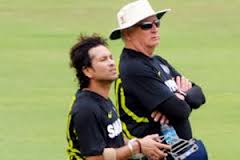
Hyderabad, August 22: Watching the Indian team nets two days before the start of the first Test against New Zealand, it's apparent why Sachin Tendulkar has weathered 23 long years of pressure and still continues to deliver for his team: His focus and dedication is second to none.
While some other legends of the game — and his contemporaries — have come and gone, the Little Master seems to have the energy and drive to carry on even at the age of 39.
One of the reasons Sachin has continued to succeed while most others have faded away is his eagerness to keep learning. Despite having scored 100 international centuries and amassing 15,470 Test and 18,426 ODI runs, he continues to be one of the finest pupils of the game.
On Tuesday, Tendulkar chose to continue his education under the watchful eyes of coach Duncan Fletcher.
Sachin took to the nets with rookie Cheteshwar Pujara after openers Gautam Gambhir and Virender Sehwag had had a 30-minute hit. Sachin faced up to the likes of Ishant Sharma and Zaheer Khan and looked quite comfortable in the middle.
There were, however, a few misses and false strokes, which didn't evade Fletcher's hawk eye. As soon as it was Pujara's turn to bat, Sachin walked over to Fletcher and the duo were involved in an animated talk, with Fletcher seeming to point out some flaws. The 'little student' then got back to the nets when his turn came again and tried to iron out the flaws all over again.
After every couple of minutes, he would return to Fletcher and chat some more. The whole process went on for a little over half an hour. There were times when Pujara would indicate that it was time for Sachin to come over and bat, but the Mumbaikar was so engrossed in his talk with Fletcher that every time he would tell Pujara to continue knocking.
After finishing his batting session, Sachin he didn't remove his pads. While most others gleefully returned to the comfort of the dressing room, he was out in the middle, talking again to Fletcher and often finetuning his strokes.
The other batsman who seemed very intent on his batting was southpaw Gambhir. After finishing his nets against the medium-pacers, he went to the spinners' net and spent a considerable amount of time.
After that, he took the help of a support staff and tried to hone his technique against short-pitched deliveries.
Ishant, who is coming off an injury layoff, continued to impress as he went full steam against the top-order batsmen. Zaheer Khan, who didn't bowl on Monday, was back in the thick of things. Umesh Yadav too was pretty lethal as he made life difficult for the batsmen.





Comments
Add new comment